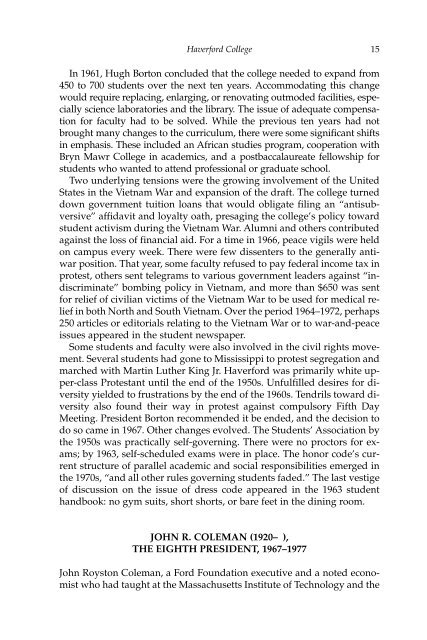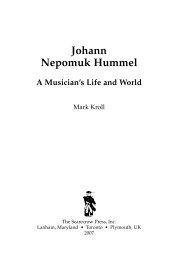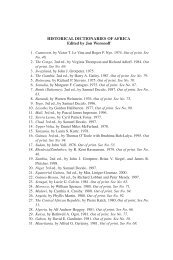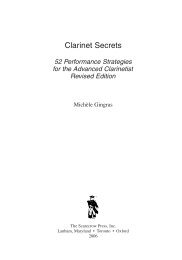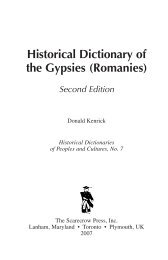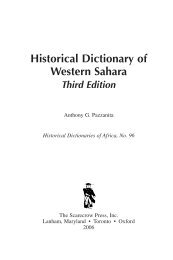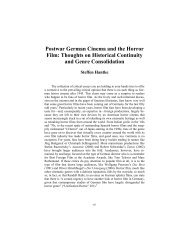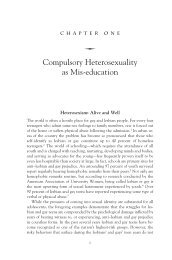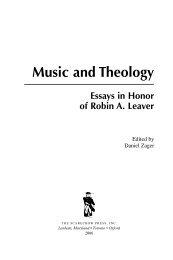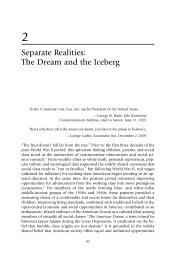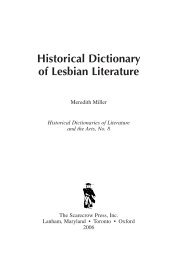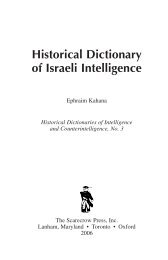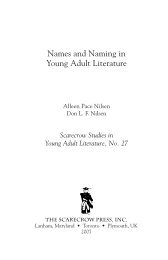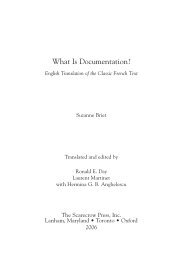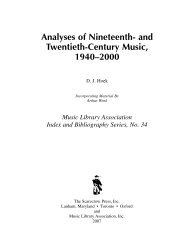Founded by Friends : the Quaker heritage of fifteen - Scarecrow Press
Founded by Friends : the Quaker heritage of fifteen - Scarecrow Press
Founded by Friends : the Quaker heritage of fifteen - Scarecrow Press
Create successful ePaper yourself
Turn your PDF publications into a flip-book with our unique Google optimized e-Paper software.
Haverford College 15<br />
In 1961, Hugh Borton concluded that <strong>the</strong> college needed to expand from<br />
450 to 700 students over <strong>the</strong> next ten years. Accommodating this change<br />
would require replacing, enlarging, or renovating outmoded facilities, especially<br />
science laboratories and <strong>the</strong> library. The issue <strong>of</strong> adequate compensation<br />
for faculty had to be solved. While <strong>the</strong> previous ten years had not<br />
brought many changes to <strong>the</strong> curriculum, <strong>the</strong>re were some significant shifts<br />
in emphasis. These included an African studies program, cooperation with<br />
Bryn Mawr College in academics, and a postbaccalaureate fellowship for<br />
students who wanted to attend pr<strong>of</strong>essional or graduate school.<br />
Two underlying tensions were <strong>the</strong> growing involvement <strong>of</strong> <strong>the</strong> United<br />
States in <strong>the</strong> Vietnam War and expansion <strong>of</strong> <strong>the</strong> draft. The college turned<br />
down government tuition loans that would obligate filing an “antisubversive”<br />
affidavit and loyalty oath, presaging <strong>the</strong> college’s policy toward<br />
student activism during <strong>the</strong> Vietnam War. Alumni and o<strong>the</strong>rs contributed<br />
against <strong>the</strong> loss <strong>of</strong> financial aid. For a time in 1966, peace vigils were held<br />
on campus every week. There were few dissenters to <strong>the</strong> generally antiwar<br />
position. That year, some faculty refused to pay federal income tax in<br />
protest, o<strong>the</strong>rs sent telegrams to various government leaders against “indiscriminate”<br />
bombing policy in Vietnam, and more than $650 was sent<br />
for relief <strong>of</strong> civilian victims <strong>of</strong> <strong>the</strong> Vietnam War to be used for medical relief<br />
in both North and South Vietnam. Over <strong>the</strong> period 1964–1972, perhaps<br />
250 articles or editorials relating to <strong>the</strong> Vietnam War or to war-and-peace<br />
issues appeared in <strong>the</strong> student newspaper.<br />
Some students and faculty were also involved in <strong>the</strong> civil rights movement.<br />
Several students had gone to Mississippi to protest segregation and<br />
marched with Martin Lu<strong>the</strong>r King Jr. Haverford was primarily white upper-class<br />
Protestant until <strong>the</strong> end <strong>of</strong> <strong>the</strong> 1950s. Unfulfilled desires for diversity<br />
yielded to frustrations <strong>by</strong> <strong>the</strong> end <strong>of</strong> <strong>the</strong> 1960s. Tendrils toward diversity<br />
also found <strong>the</strong>ir way in protest against compulsory Fifth Day<br />
Meeting. President Borton recommended it be ended, and <strong>the</strong> decision to<br />
do so came in 1967. O<strong>the</strong>r changes evolved. The Students’ Association <strong>by</strong><br />
<strong>the</strong> 1950s was practically self-governing. There were no proctors for exams;<br />
<strong>by</strong> 1963, self-scheduled exams were in place. The honor code’s current<br />
structure <strong>of</strong> parallel academic and social responsibilities emerged in<br />
<strong>the</strong> 1970s, “and all o<strong>the</strong>r rules governing students faded.” The last vestige<br />
<strong>of</strong> discussion on <strong>the</strong> issue <strong>of</strong> dress code appeared in <strong>the</strong> 1963 student<br />
handbook: no gym suits, short shorts, or bare feet in <strong>the</strong> dining room.<br />
JOHN R. COLEMAN (1920– ),<br />
THE EIGHTH PRESIDENT, 1967–1977<br />
John Royston Coleman, a Ford Foundation executive and a noted economist<br />
who had taught at <strong>the</strong> Massachusetts Institute <strong>of</strong> Technology and <strong>the</strong>


